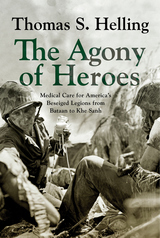302 scholarly books by University College London and 15
have author last names that start with L
302 scholarly books by University College London and 15
302 scholarly books by University College London
15 have author last names that start with L have author last names that start with L
15 have author last names that start with L have author last names that start with L
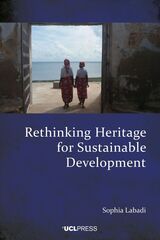
Rethinking Heritage for Sustainable Development
International Frameworks, Local Impacts
Sophia Labadi
University College London, 2022
An innovative look at heritage in sustainable development, based on archival research on UN and World Bank documents and ethnographic fieldwork in Africa.
In 2015, the UN adopted Sustainable Development Goals (SDGs), which have since influenced international and intergovernmental organizations and governments and dictated priorities for international aid spending. Culture, including heritage, is often presented as fundamental to addressing the SDGs. Yet in practice heritage is marginalized when SDGs are being discussed and implemented.
This volume presents a substantial and original assessment of whether and how heritage has contributed to three key dimensions of sustainable development (poverty reduction, gender equality, and environmental sustainability) within the context of its marginalization from the SDGs and from previous international development agendas. The book adopts a novel, inclusive, large-scale, and systematic approach, providing the first comprehensive history of the international approaches to culture (including heritage) in development from 1970 to the present day. It critically assesses the international projects implemented in sub-Saharan Africa that aimed to demonstrate the contribution of heritage for development in time for the negotiation of the SDGs, reflecting on the shortcomings of selected projects and providing recommendations for rethinking heritage for development.
In 2015, the UN adopted Sustainable Development Goals (SDGs), which have since influenced international and intergovernmental organizations and governments and dictated priorities for international aid spending. Culture, including heritage, is often presented as fundamental to addressing the SDGs. Yet in practice heritage is marginalized when SDGs are being discussed and implemented.
This volume presents a substantial and original assessment of whether and how heritage has contributed to three key dimensions of sustainable development (poverty reduction, gender equality, and environmental sustainability) within the context of its marginalization from the SDGs and from previous international development agendas. The book adopts a novel, inclusive, large-scale, and systematic approach, providing the first comprehensive history of the international approaches to culture (including heritage) in development from 1970 to the present day. It critically assesses the international projects implemented in sub-Saharan Africa that aimed to demonstrate the contribution of heritage for development in time for the negotiation of the SDGs, reflecting on the shortcomings of selected projects and providing recommendations for rethinking heritage for development.
[more]
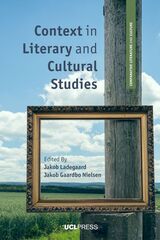
Context in Literary and Cultural Studies
Jakob Ladegaard
University College London, 2019
Context in Literary and Cultural Studies is an interdisciplinary volume that deals with the challenges of studying works of art and literature in their historical context today. The relationship between artworks and context has long been a central concern for aesthetic and cultural disciplines, and the question of context has been asked anew in all eras. Developments in contemporary culture and technology, as well as new theoretical and methodological orientations in the humanities, once again prompt us to rethink context in literary and cultural studies. This volume takes up that challenge.
Introducing readers to new developments in literary and cultural theory, Context in Literary and Cultural Studies connects all disciplines related to these areas to provide an interdisciplinary overview of the challenges different scholarly fields today meet in their studies of artworks in context. Spanning a number of countries and covering subjects from nineteenth-century novels to rave culture, the chapters together constitute an informed, diverse and wide-ranging discussion. The volume is written for scholarly readers at all levels in the fields of literary studies, comparative literature, cultural studies, art history, film, theater studies, and digital humanities.
Introducing readers to new developments in literary and cultural theory, Context in Literary and Cultural Studies connects all disciplines related to these areas to provide an interdisciplinary overview of the challenges different scholarly fields today meet in their studies of artworks in context. Spanning a number of countries and covering subjects from nineteenth-century novels to rave culture, the chapters together constitute an informed, diverse and wide-ranging discussion. The volume is written for scholarly readers at all levels in the fields of literary studies, comparative literature, cultural studies, art history, film, theater studies, and digital humanities.
[more]
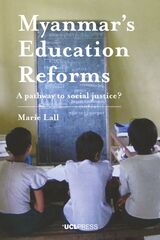
Myanmar's Education Reforms
A pathway to social justice?
Marie Lall
University College London, 2020
Myanmar’s Education Reforms reviews the changing state of education in Myanmar as the country has dealt with a profound transformation over the past decade and a half. Education has served as a litmus test for judging the level of openness of any Myanmar government, especially those in place for the past seven decades. Marie Lall situates education within the context of the wider reforms and the process of making peace that began in 2012, using it as a case study on how these reforms have progressed and continue to progress. Drawing on data collected over fifteen years in the field, Lall argues that despite controlling the majority of the civilian government, the National League for Democracy is not delivering on its promise of social justice.
[more]
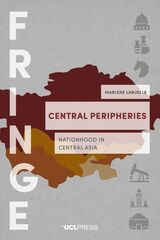
Central Peripheries
Nationhood in Central Asia
Marlene Laruelle
University College London, 2021
A comprehensive study of nation-building in post-Soviet Central Asia.
Committed to internationalism, Kazakhstan and other central Asian states nevertheless embrace classically nationalist conceptions of the nation-state. Their unabashed celebration of borders and citizenship challenges Western views of nationalism as a dying ideology transcended by cosmopolitanism. Drawing on twenty years of fieldwork, Central Peripheries reveals the origin of central Asian national consciousness in imaginary and ritualized efforts to grapple with the Soviet past.
Committed to internationalism, Kazakhstan and other central Asian states nevertheless embrace classically nationalist conceptions of the nation-state. Their unabashed celebration of borders and citizenship challenges Western views of nationalism as a dying ideology transcended by cosmopolitanism. Drawing on twenty years of fieldwork, Central Peripheries reveals the origin of central Asian national consciousness in imaginary and ritualized efforts to grapple with the Soviet past.
[more]
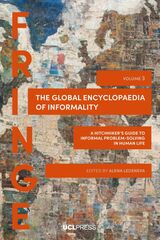
Global Encyclopaedia of Informality, Volume 3
A Hitchhiker's Guide to Informal Problem-Solving in human life
Alena Ledeneva
University College London, 2024
A journey through the informal and taken-for-granted ways of getting things done across the world.
For a post-human hitchhiker, human life–with its anxiety, aging, illness, and constant need for problem-solving–may look unviable. Yet, for humans, the life struggle is softened by human touch, human emotion, and human cooperation.
The Global Encyclopaedia of Informality, Volume 3 continues the journey of the two previous volumes into the world’s open secrets, unwritten rules, and hidden practices. It focuses on issues of emotional ambivalence and pressures of the digital age. The informal practices presented in this volume demonstrate the urgency of alleviating tensions between continuity and all-too-rapid change and the need to tackle the central problem of modern societies—uncertainty.
The volume takes the reader on a biographical journey through elusive, taken-for-granted, or banal ways of getting things done from over seventy countries and world regions. It offers an innovative understanding of the significance of fringes and challenges the assumption that informality is associated exclusively with poverty, underdevelopment, the Global South, oppressive regimes, or the former socialist countries of Eastern Europe and Central Asia. It also maps the patterns of informality around the globe, identifies specific informal practices in a context-sensitive way, and documents their ambivalent impact on people engaged in problem-solving, on societies in which these problems arise, and on humanity overall.
For a post-human hitchhiker, human life–with its anxiety, aging, illness, and constant need for problem-solving–may look unviable. Yet, for humans, the life struggle is softened by human touch, human emotion, and human cooperation.
The Global Encyclopaedia of Informality, Volume 3 continues the journey of the two previous volumes into the world’s open secrets, unwritten rules, and hidden practices. It focuses on issues of emotional ambivalence and pressures of the digital age. The informal practices presented in this volume demonstrate the urgency of alleviating tensions between continuity and all-too-rapid change and the need to tackle the central problem of modern societies—uncertainty.
The volume takes the reader on a biographical journey through elusive, taken-for-granted, or banal ways of getting things done from over seventy countries and world regions. It offers an innovative understanding of the significance of fringes and challenges the assumption that informality is associated exclusively with poverty, underdevelopment, the Global South, oppressive regimes, or the former socialist countries of Eastern Europe and Central Asia. It also maps the patterns of informality around the globe, identifies specific informal practices in a context-sensitive way, and documents their ambivalent impact on people engaged in problem-solving, on societies in which these problems arise, and on humanity overall.
[more]
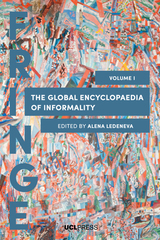
The Global Encyclopaedia of Informality, Volume I
Towards Understanding of Social and Cultural Complexity
Alena Ledeneva
University College London, 2018
Broadly defined as “ways of getting things done,” the invisible yet powerful concepts of “informal practices” tend to escape articulation in official discourse. These practices include emotion-driven exchanges of gifts or favours and tributes for services, interest-driven know-how (from informal welfare to informal employment), identity-driven practices of solidarity, and power-driven forms of co-optation and control. Yet, the possible paradox of the indiscernibility of these informal practices is their ubiquity. Alena Ledeneva’s wholly unique two-volume work collaborates with over two hundred scholars across five continents, illustrating how informal practices are deeply embedded across the globe yet still remain underestimated in policy-making procedures.
[more]
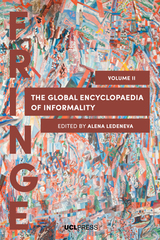
The Global Encyclopaedia of Informality, Volume II
Understanding Social and Cultural Complexity
Alena Ledeneva
University College London, 2018
Broadly defined as “ways of getting things done,” the invisible yet powerful concepts of “informal practices” tend to escape articulation in official discourse. These practices include emotion-driven exchanges of gifts or favours and tributes for services, interest-driven know-how (from informal welfare to informal employment), identity-driven practices of solidarity, and power-driven forms of co-optation and control. Yet, the possible paradox of the indiscernibility of these informal practices is their ubiquity. Alena Ledeneva’s wholly unique two-volume work collaborates with over two hundred scholars across five continents, illustrating how informal practices are deeply embedded across the globe yet still remain underestimated in policy-making procedures.
[more]
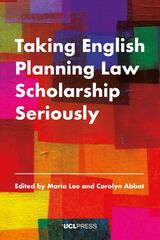
Taking English Planning Law Scholarship Seriously
Maria Lee
University College London, 2022
Insight into planning law and its place within broader institutional and legal frameworks.
Planning is at the heart of the response to many of the significant challenges of our time, from the climate and environmental crises to social and economic inequalities. It is embedded in, as well as partially constituting, our democratic systems, so that the challenges of democratic decision-making in a complex society cannot be avoided when thinking about planning. Planning law raises some of the most fundamental questions faced by legal scholars, from the legitimacy of authority to the relationship between public and private rights and interests. And yet, planning law has been relatively neglected by legal scholars. This book helps rectify that by showcasing planning law scholarship in all of its variety and complexity. The chapters reflect this by covering a range of the objects of planning (from housing to energy to highways) and a multiplicity of planning tasks and tools (from compulsory purchase to contracting to planning inquiries).
Planning is at the heart of the response to many of the significant challenges of our time, from the climate and environmental crises to social and economic inequalities. It is embedded in, as well as partially constituting, our democratic systems, so that the challenges of democratic decision-making in a complex society cannot be avoided when thinking about planning. Planning law raises some of the most fundamental questions faced by legal scholars, from the legitimacy of authority to the relationship between public and private rights and interests. And yet, planning law has been relatively neglected by legal scholars. This book helps rectify that by showcasing planning law scholarship in all of its variety and complexity. The chapters reflect this by covering a range of the objects of planning (from housing to energy to highways) and a multiplicity of planning tasks and tools (from compulsory purchase to contracting to planning inquiries).
[more]
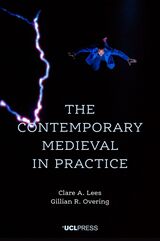
The Contemporary Medieval in Practice
Claire A. Lees
University College London, 2019
Contemporary art can provide medievalists with innovative ways to reframe the past. Meanwhile, medievalists offer contemporary art insights into cultural works of the past that have been reworked in the present.
Speculative and nontraditional, The Contemporary Medieval in Practice adapts the conventional scholarly essay to reflect its interdisciplinary subject. Creative critical writing encourages the introduction of dialogue, poetry, and short essays within scholarly style, and this, the authors argue, makes it an ideal format for exploring innovative pathways from the contemporary to the medieval. Discussing urgent critical discourses and cultural practices, such as the study of the environment and the ethics of understanding bodies, identities, and histories, this short, accessible book focuses on early medieval British culture, or Anglo-Saxon studies, and its relation with, use of, and reworking in contemporary visual, poetic, and material culture after 1950.
Speculative and nontraditional, The Contemporary Medieval in Practice adapts the conventional scholarly essay to reflect its interdisciplinary subject. Creative critical writing encourages the introduction of dialogue, poetry, and short essays within scholarly style, and this, the authors argue, makes it an ideal format for exploring innovative pathways from the contemporary to the medieval. Discussing urgent critical discourses and cultural practices, such as the study of the environment and the ethics of understanding bodies, identities, and histories, this short, accessible book focuses on early medieval British culture, or Anglo-Saxon studies, and its relation with, use of, and reworking in contemporary visual, poetic, and material culture after 1950.
[more]
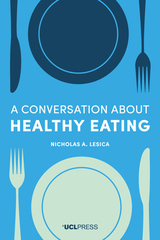
A Conversation about Healthy Eating
Nicholas A. Lesica
University College London, 2017
What constitutes a healthy diet? Media and advertisers would like us to think that the answer is complicated and controversial, but science tell us otherwise. Rather than present an ideology, A Conversation About Healthy Eating avoids the typical media noise, to presenting instead the science. This book allows for a comprehensive understanding and provides clear recommendations for how you can adapt both your environment and your lifestyle to make healthy eating possible.
[more]

Life-Writing in the History of Archaeology
Critical perspectives
Clare Lewis
University College London, 2023
A study of life-writing as a vital part of the history of archaeology and a growing field of scholarship within the discipline.
Travels and adventures of the “great archaeologists” have generated centuries worth of bestselling books that, in turn, have shaped the public perception of archaeology. The lives of archaeologists are entangled with histories of museums and collections, developments in science and scholarship, and narratives of nationalism and colonialism into the present. In recent years, life-writing has played an important role in the surge of new research in the history of archaeology, including ground-breaking studies of discipline formation, institutionalization, and social and intellectual networks. Sources such as diaries, wills, film, and the growing body of digital records are powerful tools for highlighting the contributions of hitherto marginalized archaeological lives including many pioneering women, hired laborers, and other “hidden hands.”
This book brings together critical perspectives on life-writing in the history of archaeology from leading figures in the field. These include studies of archive formation and use, the concept of “dig-writing” as a distinctive genre of archaeological creativity, and reviews of new sources for already well-known lives. Several chapters reflect on the experience of life-writing, review the historiography of the field, and assess the intellectual value and significance of life-writing as a genre. Together, they work to problematize underlying assumptions about this genre, foregrounding methodology, social theory, ethics, and other practice-focused frameworks in conscious tension with previous practices.
Travels and adventures of the “great archaeologists” have generated centuries worth of bestselling books that, in turn, have shaped the public perception of archaeology. The lives of archaeologists are entangled with histories of museums and collections, developments in science and scholarship, and narratives of nationalism and colonialism into the present. In recent years, life-writing has played an important role in the surge of new research in the history of archaeology, including ground-breaking studies of discipline formation, institutionalization, and social and intellectual networks. Sources such as diaries, wills, film, and the growing body of digital records are powerful tools for highlighting the contributions of hitherto marginalized archaeological lives including many pioneering women, hired laborers, and other “hidden hands.”
This book brings together critical perspectives on life-writing in the history of archaeology from leading figures in the field. These include studies of archive formation and use, the concept of “dig-writing” as a distinctive genre of archaeological creativity, and reviews of new sources for already well-known lives. Several chapters reflect on the experience of life-writing, review the historiography of the field, and assess the intellectual value and significance of life-writing as a genre. Together, they work to problematize underlying assumptions about this genre, foregrounding methodology, social theory, ethics, and other practice-focused frameworks in conscious tension with previous practices.
[more]
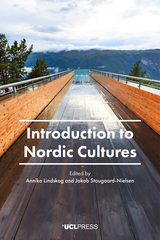
Introduction to Nordic Cultures
Annika Lindskog
University College London, 2020
Introduction to Nordic Cultures is an innovative, interdisciplinary introduction to Nordic history, cultures, and societies from medieval times to today. The textbook spans the whole Nordic region, covering historical periods from the Viking Age to modern society, and engages with a range of subjects: from runic inscriptions on iron rings and stone monuments, via eighteenth-century scientists, Ibsen’s dramas and turn-of-the-century travel, to twentieth-century health films and the welfare state, nature ideology, Greenlandic literature, Nordic Noir, migration, ‘new’ Scandinavians, and stereotypes of the Nordic. This book provides fundamental knowledge and insights into the history and structures of Nordic societies while constructing critical analyses around specific case studies that help build an informed picture of how societies grow and of the interplay between history, politics, culture, geography, and people.
[more]

Violent Extremism
A Handbook of Risk Assessment and Management
Caroline Logan
University College London, 2023
A practical study of the prevention of violent extremism.
Violent extremism has galvanized public fear and attention. Driven by their concerns, the public has pushed for law enforcement and mental health systems to prevent attacks rather than just respond to them after they occur. The prevention process requires guidance for practitioners and policymakers on how best to identify people who may be at risk, to understand and assess the nature and function of the harm they may cause, and to manage them to mitigate or prevent harm. Violent Extremism provides such guidance.
Over ten chapters, prepared by leading experts, this handbook illuminates the nature of violent extremism and the evolution of prevention-driven practice. Authors draw on the literature and their experience to explain which factors might increase (risk factors) or decrease (protective factors) risk, how those factors might operate, and how practitioners can prepare risk formulations and scenario plans that inform risk management strategies to prevent violent extremist harm.
Each chapter is crafted to support thoughtful, evidence-based practice that is transparent, accountable, and ultimately defensible. Written for an international audience, the volume will be of interest to law enforcement and mental health professionals, criminal justice and security personnel, as well as criminologists, policymakers, and researchers.
Violent extremism has galvanized public fear and attention. Driven by their concerns, the public has pushed for law enforcement and mental health systems to prevent attacks rather than just respond to them after they occur. The prevention process requires guidance for practitioners and policymakers on how best to identify people who may be at risk, to understand and assess the nature and function of the harm they may cause, and to manage them to mitigate or prevent harm. Violent Extremism provides such guidance.
Over ten chapters, prepared by leading experts, this handbook illuminates the nature of violent extremism and the evolution of prevention-driven practice. Authors draw on the literature and their experience to explain which factors might increase (risk factors) or decrease (protective factors) risk, how those factors might operate, and how practitioners can prepare risk formulations and scenario plans that inform risk management strategies to prevent violent extremist harm.
Each chapter is crafted to support thoughtful, evidence-based practice that is transparent, accountable, and ultimately defensible. Written for an international audience, the volume will be of interest to law enforcement and mental health professionals, criminal justice and security personnel, as well as criminologists, policymakers, and researchers.
[more]

The Bankruptcy
A Novel
Júlia Lopes de Almeida
University College London, 2023
The first novel-length translation of Júlia Lopes de Almeida’s writing into English.
Set in the early years of Brazil’s Old Republic after the abolition of slavery, Júlia Lopes de Almeida's The Bankruptcy depicts the rise and fall of a wealthy coffee exporter against a kaleidoscopic background of glamour, poverty, seduction, and financial speculation. The novel introduces readers to a turbulent period in Brazilian history seething with new ideas about democracy, women’s emancipation, and the role of religion in society. Originally published in 1901, its prescient critiques of financial capitalism and the patriarchal family remain relevant today.
In her lifetime, Júlia Lopes de Almeida was compared to Machado de Assis, the most important Brazilian writer of the nineteenth century. She was also considered for the inaugural list of members of the Brazilian Academy of Letters but was excluded because of her gender. In the decades after her death, her work was largely forgotten. This publication, a winner of the English PEN award, includes an introduction to the novel and a translators' preface and accompanies a general rediscovery of her extraordinary body of work in Brazil.
Set in the early years of Brazil’s Old Republic after the abolition of slavery, Júlia Lopes de Almeida's The Bankruptcy depicts the rise and fall of a wealthy coffee exporter against a kaleidoscopic background of glamour, poverty, seduction, and financial speculation. The novel introduces readers to a turbulent period in Brazilian history seething with new ideas about democracy, women’s emancipation, and the role of religion in society. Originally published in 1901, its prescient critiques of financial capitalism and the patriarchal family remain relevant today.
In her lifetime, Júlia Lopes de Almeida was compared to Machado de Assis, the most important Brazilian writer of the nineteenth century. She was also considered for the inaugural list of members of the Brazilian Academy of Letters but was excluded because of her gender. In the decades after her death, her work was largely forgotten. This publication, a winner of the English PEN award, includes an introduction to the novel and a translators' preface and accompanies a general rediscovery of her extraordinary body of work in Brazil.
[more]
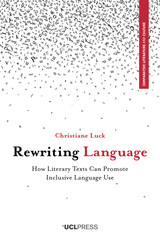
Rewriting Language
How Literary Texts Can Promote Inclusive Language Use
Christiane Luck
University College London, 2020
Extensively studied and heavily debated, inclusive language is a hot topic. Despite decades of research and scholarship, findings on its importance slip into neglect. How do we convince speakers of the importance of inclusive language? Christiane Luck’s Rewriting Language provides one possible answer: read fiction.
By engaging readers with the issue, novels spread awareness and promote linguistic change. Novels have the power to paint the problems presented with accessibility and spark change. Analyzing five iconic literary texts, including Ursula K. Le Guin’s The Left Hand of Darkness, Verena Stefan’s Häutungen, Marge Piercy’s Woman on the Edge of Time, and June Arnold’s The Cook and the Carpenter, Luck dives into the possibilities and challenges of linguistic neutrality. Rewriting Language illustrates the link between language and imagination. As Luck concludes, novels are valuable tools to embolden inclusive language use.
By engaging readers with the issue, novels spread awareness and promote linguistic change. Novels have the power to paint the problems presented with accessibility and spark change. Analyzing five iconic literary texts, including Ursula K. Le Guin’s The Left Hand of Darkness, Verena Stefan’s Häutungen, Marge Piercy’s Woman on the Edge of Time, and June Arnold’s The Cook and the Carpenter, Luck dives into the possibilities and challenges of linguistic neutrality. Rewriting Language illustrates the link between language and imagination. As Luck concludes, novels are valuable tools to embolden inclusive language use.
[more]
READERS
Browse our collection.
PUBLISHERS
See BiblioVault's publisher services.
STUDENT SERVICES
Files for college accessibility offices.
UChicago Accessibility Resources
home | accessibility | search | about | contact us
BiblioVault ® 2001 - 2024
The University of Chicago Press




